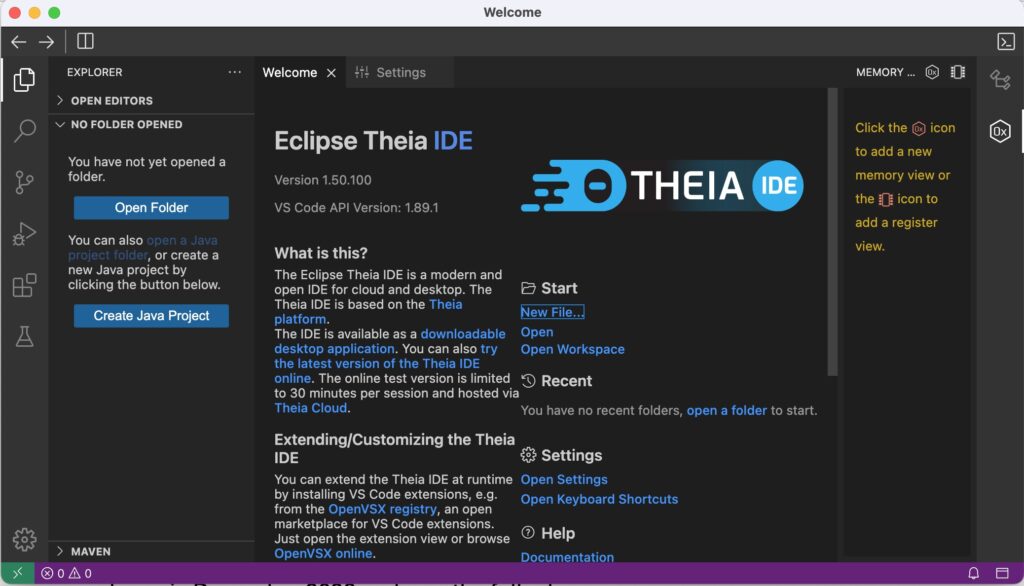
The Eclipse Theia project has released the first non-beta version of Eclipse Theia IDE, based on core Visual Studio Code (VS Code) technology but without its proprietary code, telemetry, and Microsoft product license.
Theia itself is not new; the project goes back to 2017, though initially it was focused on web-based tools and on providing a platform for others to build on. A factor perhaps was that Eclipse Foundation already had an IDE: the Java-based Eclipse IDE which was first released more than 20 years ago and remains highly active: version 2024-06 was released earlier this month.
Developers though demanded a complete Theia IDE and in 2021 the Theia Blueprint project kicked off as a standard IDE product. This became the Theia IDE, with a beta release in December 2023 and now the full release.
Like VS Code, Theia IDE can be used both as a desktop application and within a browser. Part of the thinking is that it can be integrated into “online portals or company environments,” as noted in the release post from EclipseSource, a company which provides consulting and training for Eclipse open source developer tools including Theia IDE.

Microsoft explains in the VS Code FAQ that the open source MIT-licensed product is called Code – OSS and that VS Code is a distribution of Code – OSS which “includes Microsoft proprietary assets (such as icons) and features Visual Studio Marketplace integration, small aspects of enabling Remote Development.” The company deliberately makes it possible to fork Code – OSS and build a functional editor. There is also VSCodium which is not a fork but provides binaries built from open source VS Code.
Theia also uses this source but with more changes. A post last year from the Theia project described limitations in Code – OSS such as inflexibility in adapting the default workbench (the overall VS Code UI), whereas Theia makes it possible to add and remove features. Theia has its own extension mechanism alongside support for the VS Code extension mechanism. The Eclipse team also observes that “Code – OSS is governed by Microsoft as a single point of control,” whereas Theia is governed by the Eclipse Foundation.
Despite these differences, there are several problems confronted by third-parties seeking to compete with VS Code by building on its open source components. One is that Microsoft positions the VS Code Marketplace, for distributing extensions, as an unique feature of VS Code, which forks and clones are not allowed to use. The Marketplace is critical to developers, since a key reason for the success of VS Code is the availability of thousands of extensions. The alternative is the Open VSX Registry for “VS Code compatible editors”, which at the time of writing appears to have 3,783 extensions, whereas the VS Code Marketplace has 60,349. Quantity is not everything; but download figures also tell a story, with Red Hat’s Language Support for Java, for example, having 35.9 million downloads, versus 1 million on Open VSX.
Another issue is that in most cases the proprietary aspect of VS Code does not much impact developers – an exception being the .NET support in C# Dev Kit for which enterprises require a paid license, but it seems unlikely that .NET developers will switch en masse to Theia which is not well served with .NET extensions.
Three years ago Gitpod, a cloud IDE company which initially supported Theia, declared that it would deprecate support of Theia, the reason given being that “Theia is similar to VS Code and the main reason we picked Theia in the first place was to provide a VS Code-like UX to our users. Since VS Code itself now runs well in browsers, we decided to go with the original in order to remove the ‘-like’ in ‘vscode-like experience’.” That said, Gitpod uses Code – OSS so suffers from the same restriction to Open VSX.
Theia does, however, form an attractive choice for developers in search of a Microsoft-free adaption of VS Code as well as for those needing a highly adaptable tools platform, which was the original purpose of the project.
